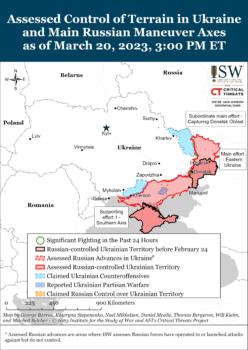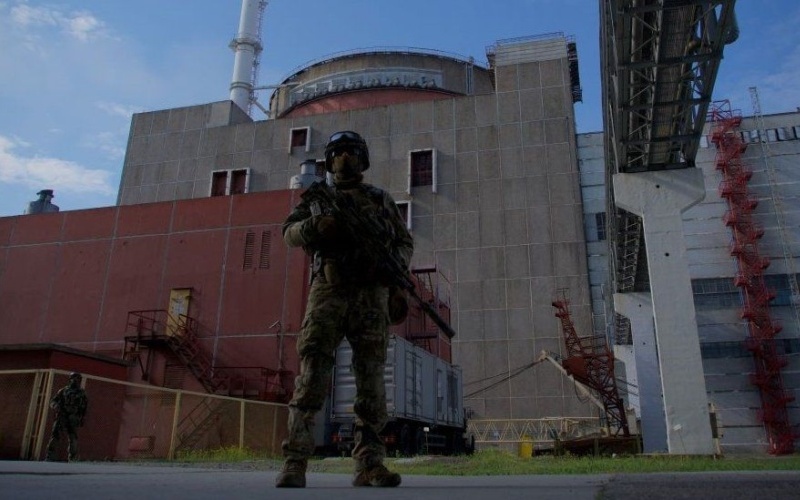A Russian soldier stands guard at the Zaporizhzhia nuclear powr plant in southern Ukraine, May 2022 (Getty)
EA on Australia’s ABC: Putin’s Nuclear Bluster
Tuesday’s Coverage: Russia’s Drones Downed Over Kyiv

Map: Institute for the Study of War
UPDATE 1815 GMT:
Germany has committed an additional €12 billion ($13 billion) in military support to Ukraine over the next decade.
The Bundestag Budget Committee authorized the request of the Defense Ministry and Foreign Office for about €8 billion ($8.67 billion) for weapons and equipment for Kyiv. The other €4 billion ($4.33 billion) will replenish German stocks.
Germany has already provided more than €14.2 billion ($15.4 billion) in support for Ukraine during the Russian invasion.
UPDATE 1645 GMT:
In a televised Government meeting, Vladimir Putin has admitted, “The sanctions imposed against the Russian economy in the medium term could really have a negative impact.”
He insisted that the Kremlin was adapting to the measures.
Anton Gerashchenko, an advisor to the Ukraine Interior Ministry, has shared the footage.
Putin says sanctions "might have a negative impact" on Russian economy. pic.twitter.com/9qcHKERKTp
— Anton Gerashchenko (@Gerashchenko_en) March 29, 2023
UPDATE 1633 GMT:
International Atomic Energy Agency head Rafael Grossi, touring the Russian-occupied Zaporizhzhia Nuclear Power Plant, has told Russian news agencies:
Obviously, the situation is not improving, on the contrary, hostilities around this territory are intensifying. All possible measures must be taken to protect the station from any attack.
UPDATE 1247 GMT:
Hungary is continuing to block Sweden’s accession to NATO.
On Monday, Prime Minister Viktor Orbán — a long-time ally of Vladimir Putin — lifted his blockade of Finnish accession, with the Hungarian Parliament overwhelmingly approving Oslo’s NATO membership.
But government spokesman Zoltan Kovacs said on his blog, “In the case of Sweden, there is an ample amount of grievances that need to be addressed before the country’s admission is ratified”.
He claimed Swedish representatives “have been repeatedly keen to bash Hungary through diplomatic means, using their political influence to harm Hungarian interests”.
Hungary and Turkey have been the only two of NATO’s members to stand in the way of Finnish and Swedish accession. Turkish President Recep Tayyip Erdoğan, seeking leverage against the Kurdish population in both countries, has also now accepted Oslo’s membership while holding out over Stockholm.
UPDATE 1236 GMT:
More than 1/3 of the Kremlin’s budget is now classified or unspecified.
The secret expenditure through March 24 has risen to 2.4 trillion rubles ($31 billion), more than double the level of a year ago.
UPDATE 1122 GMT:
International Atomic Energy Agency head Rafael Grossi and his team are now at the Russian-occupied Zaporizhzhia Nuclear Power Plant.
⚡️The #IAEA delegation headed by Director General Rafael #Grossi, accompanied by Russian military police, went to the #Zaporizhzhia Nuclear Power Plant.
📹: Telegram / OperativnoZSU pic.twitter.com/0kaJhWsEan
— KyivPost (@KyivPost) March 29, 2023
UPDATE 1118 GMT:
UK Defence Secretary Ben Wallace, citing figures from US agencies, says more than 220,000 Russian personnel have been killed or injured during Vladimir Putin’s invasion.
UPDATE 0803 GMT:
One of the world’s largest commodities traders, Cargill, will stop exporting Russian grain July 1.
Russia’s Agriculture Ministry insisted, “The cessation of [Cargill’s] export activities on the Russian market will not affect the volume of domestic grain shipments abroad. The company’s grain export assets will continue to operate regardless of who manages them.”
UPDATE 0646 GMT:
Russia’s downing of a US surveillance drone over the Black Sea earlier this month has succeeded in restricting American information on Moscow’s invasion of Ukraine, says a US military official.
The official said the US is flying drones further to the south and at higher altitudes, which “definitely limits our ability to gather intelligence”.
He said satellites can compensate to some degree but have shorter times over areas such as Crimea and the eastern Black Sea.
Another US official has said the new routes are “to avoid being too provocative”. The official said the drone flights will be conducted this way “for the time being”, but there “an appetite” to return to the routes closer to Russian-occupied territory.
UPDATE 0628 GMT:
Having failed to cripple Ukraine with cyber-attacks, Russia’s operatives are now focusing on European countries supporting Kyiv, conclude French and US analysts.
Microsoft reports Russian attacks on at least 17 countries in the first six weeks of this year.
The French defense firm Thales said on Wednesday that the Russians are attacking Poland and the Nordic and Baltic countries with a variety of cyber-weapons.
UPDATE 0613 GMT:
Explosions are reported this morning in Russian-occupied Melitopol in southern Ukraine.
Russian media, citing Moscow’s proxy officials, say shelling by Ukrainian forces has cut the power supply had been cut in the city and nearby villages. A locomotive depot has been destroyed.
Melitopol, seized in the first days of the invasion, is a vital link for Russian forces moving between occupied eastern and southern Ukraine.
ORIGINAL ENTRY: The head of the International Atomic Energy Agency, Rafael Grossi, says the situation at the Russian-occupied Zaporizhzhia nuclear plant in southern Ukraine is “very dangerous” and very unstable.
Grossi spoke on Tuesday in the midst of yet another attempt to establish a “protected zone” at the plant, the largest in Europe, which was seized by Russia in March 2022 and is being used as a military base.
Amid Russian attacks from the site on Ukrainian territory across the Dnipro River. the nuclear facility has lost its external power supply six times and had to relying on backup emergency diesel generators to cool the six reactors.
Grossi said water in a nearby reservoir controlled by Russian forces is at a potentially dangerous level.
If the reservoir level goes down beyond a certain level, then you don’t have water to cool down the reactors, and we have seen especially in January that the levels of the water were going down significantly. They recovered somehow in the past few weeks.
He noted that military activity in the Zaporizhzhia region, split between Ukrainian and Russian control, is increasing.
Grossi met Ukraine President Volodymyr Zelenskiy at the Dnipro hydroelectric power station, northeast of the Zaporizhzhia plant, on Monday. He is expected to travel to the nuclear complex on Wednesday.
Russian officials held off on a trip by Grossi to Moscow this week, but have said that it will happen “soon”.
The Russians have rejected all efforts by the UN and the IAEA for demilitarization of the plant with withdrawal of troops and a cessation of attacks.
But Grossi said Tuesday:
I am confident that it might be possible to establish some form of protection, perhaps not emphasizing so much the idea of a zone, but on the protection itself: what people should do, or shouldn’t do to protect [the plant] instead of having a territorial concept.

